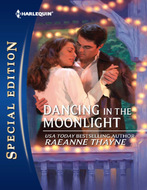Kitap dosya olarak indirilemez ancak uygulamamız üzerinden veya online olarak web sitemizden okunabilir.
Kitabı oku: «Everything She's Ever Wanted»
“I won’t be charmed by a man again. Nor am I seeking the quick bed bounce.”
“Who said that’s what I’m after?”
“Why wouldn’t you want sex?”
He hadn’t moved. “Two reasons. One, both of us have to agree and, two, we both have to feel it’s right.”
“It won’t be for me. It was difficult enough in my marriage.”
“You married the wrong man.”
He stood with his back to the living room window. Against the backdrop of the wet day, his big shoulders appeared tougher than usual, potent.
A surge of yearning shot through her.
She wanted him to see her as a woman.
She wanted him to care. To make love to her, with her.
Most of all, she wanted to be wanted.
Dear Reader,
Well, as promised, the dog days of summer have set in, which means one last chance at the beach reading that’s an integral part of this season (even if you do most of it on the subway, like I do!). We begin with The Beauty Queen’s Makeover by Teresa Southwick, next up in our MOST LIKELY TO…miniseries. She was the girl “most likely to” way back when, and he was the awkward geek. Now they’ve all but switched places, and the fireworks are about to begin….
In From Here to Texas, Stella Bagwell’s next MEN OF THE WEST book, a Navajo man and the girl who walked out on him years ago have to decide if they believe in second chances. And speaking of second chances (or first ones, anyway), picture this: a teenaged girl obsessed with a gorgeous college boy writes down some of her impure thoughts in her diary, and buries said diary in the walls of an old house in town. Flash forward ten-ish years, and the boy, now a man, is back in town—and about to dismantle the old house, brick by brick. Can she find her diary before he does? Find out in Christine Flynn’s finale to her GOING HOME miniseries, Confessions of a Small-Town Girl. In Everything She’s Ever Wanted by Mary J. Forbes, a traumatized woman is finally convinced to come out of hiding, thanks to the one man she can trust. In Nicole Foster’s Sawyer’s Special Delivery, a man who’s played knight-in-shining armor gets to do it again—to a woman (cum newborn baby) desperate for his help, even if she hates to admit it. And in The Last Time I Saw Venice by Vivienne Wallington, a couple traumatized by the loss of their child hopes that the beautiful city that brought them together can work its magic—one more time.
So have your fun. And next month it’s time to get serious—about reading, that is….
Enjoy!
Gail Chasan
Senior Editor
Everything She’s
Ever Wanted
Mary J. Forbes

To Elaine, for sharing Kinderhook Lane and other things…
MARY J. FORBES
grew up on a farm in Alberta amidst horses, cattle, crisp hay and broad blue skies. As a child, she drew and wrote about her surroundings, and in sixth grade composed her first story about a lame little pony. Years later, she was an accountant and worked as a reporter/photographer for a small-town newspaper and attained an honors degree in education. She also wrote and published short fiction.
Today, Mary—a teacher by profession—lives in the Pacific Northwest with her husband and two children. A romantic by nature, she loves walking along the ocean shoreline, sitting by the fire on snowy or rainy evenings and two-stepping around the dance floor to a good country song—all with her own real-life hero, of course. Mary loves to hear from readers. You can contact her at www.maryjforbes.com.
Dear Reader,
The idea for Seth’s story came to me a number of years ago when my husband and I purchased a home in a residential area under construction. The site was atop a small mountain forested with pine trees. A couple times a week, dynamite blasted away boulders and bedrock, and eventually houses rose along those winding carved-out streets.
Since we were the first family to move into the area, we were surrounded by machinery, hard-hatted guys and dust. Dawn till dusk. Still, I walked our German shepherd every day. Up and down and around that mountain. Gravel trucks would pass by with loads of dirt or rock. One friendly driver took a liking to my dog. Each time he saw us walking along the newly cemented sidewalk, he would slow his monstrous Peterbilt, lean out the window and ask questions about her—or croon some doggie nonsense. Sometimes, if he was in a hurry, he’d simply wave and call, “How’s the pup?”
Well, how could I not ponder questions of my own on those walks? Like… What if a man driving a Paul Bunyan truck carried a secret fear? What if he lost his child to a custody battle? What if that child was unsure of his love…?
Since I also taught school and have, over the years, encountered hundreds of kids, it didn’t take long for my imagination to meld a child’s face into that nameless trucker’s life. But then, I went on to writing other stories, and my “Seth” faded into obscurity. Until now. Until he walked through the mist of my memories and demanded his story be the next of my Tucker brothers’ trilogy, in Everything She’s Ever Wanted.
So here he is—builder-man to the rescue. Happy reading!

Contents
Chapter One
Chapter Two
Chapter Three
Chapter Four
Chapter Five
Chapter Six
Chapter Seven
Chapter Eight
Chapter Nine
Chapter Ten
Chapter Eleven
Chapter Twelve
Chapter Thirteen
Epilogue
Chapter One
Memo To Self:
A woman alone on a deserted residential street at nine o’clock at night might expect trouble. One on the town outskirts, hiking along a highway, stands out like a lure in clear water.
Breena Quinlan timed the words with each step. Wind bit her cheeks, paralyzed her fingers. She clutched the single brown bag of groceries against her thin fleece jacket. Fleece, when autumn bent toward winter, for goodness sake!
A rig, from its sound, crested the hill behind her. Headlights flashed through the brittle night air, etching her against the blacktop.
Think gloves, scarf, Aunt Paige, shop. Don’t think of the truck slowing. Slowing.
She ducked her head against another swat of October wind.
Air brakes hissed. The truck shuddered, stopped.
Keep walking.
“That your Blazer back there, ma’am?” a male voice inquired.
Breena picked up her pace. Why hadn’t she brought her cell phone?
Brakes squawked; the massive vehicle—a gravel truck—jerked gently forward.
“Ma’am, I know what you’re thinking.” Lit by dash lights, the driver laid a flannel-sleeved arm along the ledge of his rolled-down window. “I’m not that kind of guy. Name’s Seth Tucker. I own Tucker Contracting Limited here in Misty River.” He patted the door. “If you don’t believe me, read the logo.”
Breena shot a look toward the dark panel. Across twenty feet of night, the words were indistinguishable. Didn’t mean a thing. He might be a hired driver.
“Look,” he said, scanning the road ahead. “I’m on my way back to the job site to get my pickup. Let me call a tow truck from my cell. Then you can head back to your vehicle and wait out of the wind.”
“I’m all right,” she managed through stiff lips.
“You’re frozen,” he countered. “What the hell good will that do you if a real creep comes along?”
Touché. Her hands, face, legs were iced wood; it was a wonder she set one foot in front of the other.
“Fine,” the driver said. “You walk. I’ll drive alongside till we get to where you’re going.”
She stopped. He jammed the brakes. The truck ground to a halt, tire chains swinging, clinking below its undercarriage.
Five long seconds, the engine grumbled between them while she contemplated the situation and he contemplated her.
Should she take the offer? Get out of the cold wind? Stranger danger isn’t only for kids, Breena.
Scented of dead grass and diesel, the wind licked her face, stabbed through her frayed jeans; the bag rustled in her arms. She worked numbed lips. “Earth’s Goodness, do you know it?”
“Yep.” Again he studied the road. “Half mile off.” His scrutiny fastened on her. “Doesn’t it close at five?”
“I’m staying in a back room.” Far too much information.
But I’m frozen.
And a fool.
“Ah. You must be Paige Quinlan’s relative.”
So. He knew her. Benefits of small-town grapevines. “She’s my great-aunt.” Enough said. Her family wasn’t his business.
Shivers trilled her spine. Before she could think it through, she asked, “Your truck warm?”
“Like morning coffee.”
She clamped her rattling teeth. What she wouldn’t give for a Starbucks “tall with room.” Still, she debated.
The trucker rubbed a knuckle down his cheek. “Would it make a difference if I told you my brother’s the police chief here? You might’ve seen him around. Big, black-haired giant?”
“Jon Tucker?”
“That’s him.”
“He’s your brother?”
“All six-five of ’im.”
His dry tone had her frozen lips hooking a smile. The manager of the Sleep Inn Motel, where she’d first stayed after arriving in Misty River, cited Chief Tucker as the “biggest bugger you ever saw,” a titan who’d swept the town clean of its small-time pot growers last fall with what Breena thought must have been a Paul Bunyan-sized broom. She shifted the weighty bag. Could she go wrong with the sibling of such an icon?
People hailed John Wayne Gacy a pillar of the community. A construction man.
“Ma’am?” the trucker queried. “Call him on my cell, if you want. Or call your aunt—she knows me.”
“No, that’s fine.” Right or wrong she trusted this Tucker fellow’s words. Besides, what psychopath would ask a victim to call a cop? She crossed the pavement.
The driver’s door opened; he swung down.
He was tall. Maybe not as tall as his brother, but close—with shoulders that matched the powerful truck he drove. For three seconds, the interior lights marked dark, shaggy hair and a face sharpened by nature. Then he stepped out of the shadow of the massive vehicle toward her.
“Seth Tucker the trucker, ma’am.”
Ma’am. She fancied him saluting an eyebrow in chivalry: a shy Wyoming cowboy. Instead, he smiled, slow, crooked, nabbing her air. Extending a hand, he engulfed hers with blessed warmth.
“Breena Quinlan.” Never again Breena De Laurent.
He gave a polite little clip of his head. “Best get inside, Miss Quinlan, before you turn into an Alaskan icicle.”
“Breena,” she told him, slipping her hand away. The loss of warmth hurt.
He took the bag from her stiff, aching arms without hesitation and led her around the enormous, grinding motor to the passenger side. Gravel gnashed under his boots as he opened the door, set her groceries on the floorboard.
“Grab hold of the hand rail here,” he advised. “Careful, there are two stairs.”
She stepped onto the first of two-foot-high running boards, curved stiff fingers around the rung; a second later, he cupped her elbow, boosting her up into wonderful warmth. Behind her, the door slammed. The cab resembled the cockpit of a small plane. Dials and gizmos illuminated the dash; the steering wheel was the size of a car tire. Overhead, a pair of digital speakers offered soft oldies. Words to match her mood.
A man obviously born to big trucks, he leapt into the driver’s bucket seat, hit the control for the hot air, settled back, slipped the clutch. Glancing into both side mirrors, he shoved the stick into gear and edged onto the highway.
Against her legs vented heat chased chills.
“Rub your hands together, then rub your arms.”
“W-what?”
“Hands, arms. Rub them. You’ll warm up quicker.”
The meager exercise coaxed her blood to pump, her skin to heat. “Thanks,” she said when her lips softened and her teeth stopped clattering.
“Welcome.”
He maneuvered to an easy speed. She said, “Is this normal weather for Oregon?”
Again, the slow smile. “For October. You’re lucky it isn’t raining. Where you from?”
“San Francisco.”
“Just visiting?”
“In a way.” The decision to come to this northwestern part of Oregon on a year’s leave of absence had seemed reasonable three weeks ago. Buying into her great-aunt Paige’s shop, two days ago, suddenly seemed rash. What did she know about running a quaint, run-down, artsy shop like Aunt Paige’s, with its candles and chimes, pottery and potpourri? Its shell-framed mirrors and flower-shaped lamps, quilted bags and cloth pictures?
She knew about reviewing case histories. Drug and child abuse. Runaways. Severed homes. She knew about mending people’s broken hearts, their jagged lives.
Or she had, once. Before Leo’s betrayal.
Yet, it felt right, this decision. She would learn. The Ph.D. packed in a Frisco storage locker had taught her about hard work and sweat years ago.
And if you fall flat on your face? She’d return to Frisco, to her family therapy practice. Even if it killed her to live in the same city as Leo and Lizbeth. Oh, God. Even now, seven months after she’d seen them on that California beach, Breena felt the white jolt of shock. Her husband and her sister. Kissing. His hands caressing Lizbeth’s body.
Breena’s stomach lurched. She gripped the armrest, holding herself in place. Holding the hurt, the pain in place. She couldn’t, however, contain seven years of marriage. The past lived and breathed inside her, while the future spread out like a road meandering into a fire-blackened forest.
“You okay?” The man beside her stared down the dark highway, narrowed in the headlights. His hands—big, broad, long-fingered—lay relaxed on the wheel.
She sat back, curled her own hands into her lap. “Yes, I’m—fine.” Now.
“You run out of gas back there?”
“No. I think something broke in the engine. There was a lot of clanging.” She perused the myriad dashboard devices. “I’ve never ridden in a Goliath truck. It’s quite an anomaly.”
He smiled. “Anomalies can still be safe.”
Did he mean his truck or himself?
Maybe he figured her an affluent city-dweller, testing out homey country life. Or a California sun-bum out for “an experience.” Because he had been kind enough to supply her a ride, she wanted to set him straight. But how? If she said, “I’m tired of the rat race,” he’d assume her rich and fabulous, dabbling in the eccentric backwoods. If she said, “I want a change,” he’d assume she’d opted for “experience.”
Oh, yes, she wanted small-town life, itched for change. But more than anything, she longed for permanency, acceptance. Far away from Leo and Lizbeth.
Against the black asphalt the tires harmonized with ‘Hey, Jude.’ The Beatles’ oldie calmed her edgy nerves.
“I couldn’t stay in Frisco,” she found herself saying. “And I don’t know that I can go back.”
“Sometimes it’s best to move away, then.”
She watched a dark band of trees slip by under the cool moon. A few homes appeared, huddled in the night, their yellow lights soft, inviting. “Misty River seems like a decent town to move to,” she murmured.
“It’s okay. Folks ’round here all know each other. That can be a blessing or a drag.”
Which will I be?
“If you stay,” he continued, “they’ll get to know you, too.”
“Some do already.” Their eyes met across the console. “And now you.”
“Yeah.” His mouth quirked. “Now me.”
She thought of asking if his family had lived here forever, if he had a wife, children. Small talk to pass the minutes.
The shop’s oval sign, a charming weave of words and ivy painted on wood hanging from wrought-iron tapestry, beckoned with welcoming, amber light. He slowed for the cramped, elm-lined street feeding into the older section of town.
“Let me off at the corner,” she told him. “I can walk the last block.”
She didn’t want him parking in front of the shop. She didn’t want her nosy neighbor Delwood Owens peering out his window across the street and seeing Seth Tucker, whom she believed to be a good and honest man, dropping the new woman in town off at her aunt’s shop on a dark, wind-tossed night. Most of all, she didn’t want Seth wondering why she wasn’t living in Aunt Paige’s house, but in back of a store, why she saw independence as an avenue to regaining her self-esteem—a phoenix rising from the cinders of a husband’s infidelity.
Apparently, Seth Tucker cared nothing of what she or the neighbors thought.
He pulled up along the curb, got out, rounded to her side and hoisted the bag from her arms before she could climb down. Slamming the door shut, he turned and walked her down the sidewalk, through the squeaky, little swing gate in the middle of the crumbling stone wall edging the front property, right up the beveled, pitted walkway—the one she was convincing her aged, arthritic aunt to repair—right to the house, as if it were the most natural thing for him to do. Perhaps it was. Perhaps women were a common commodity at Seth Tucker’s side.
The image unsettled Breena. She didn’t want this stranger to be a womanizer, like Leo, but a man of honor and decency. But what unsettled her most was that she cared. Why? After tonight, she’d be lucky if he remembered her at the local post office. The image savored regret.
He stopped by the porch steps. “Which door—here or back?”
“Back.” She followed the worn dirt path around the house. The glow of lights up and down the street ousted shadows; in the backyard, darkness was thick, black. The one-car garage and contorted old apple tree imprinted a Halloween mood.
A tart wind speared her jacket, shuffled her hair. She folded her hands under her arms. Seth wore no coat. Was he cold, this quiet, gentle bear of a man?
At the back door, she pulled the key from her purse, took back her groceries. “Thanks again. You’re very kind.” She tendered a smile, hoped he didn’t expect to be asked inside.
He said, “I’ll call Bill, see if he can get a tow out to your truck.”
“Bill?”
“The Garage Center. He’ll need your keys as well.”
She shook her head. “That’s not necessary. I can phone the autobody shop.” She unlocked the door, flicked the inside light. “You’ve done enough already. I don’t want to impose—”
“You’re not. I’ve known Bill since we were kids. He’ll take care of your vehicle.”
His eyes told her if he called, the Blazer would be taken care of immediately. She needed the thing. Parked on the side of a highway all night, who knew what morning would bring? In some parts of Frisco, she’d be lucky to have an axle left. But this was small-town America where the worst criminal likely was a shoplifter.
“All right. Would you like to come in and use the phone?”
“I have my cell.”
Of course. She knew that.
He glanced toward the alley, where someone peered from a kitchen window. “Go on in. You’ll get chilled again.”
Handing over her car keys, she went, one hand gripping the edge of the door. “I appreciate this. Thank you, Seth.”
A scant smile. “My pleasure.”
She watched him walk away, then closed the door. Leaning her forehead against its wood, she exhaled the breath she’d been holding and shut her eyes.
For the first time in months, she didn’t see Leo’s face.
Seth pulled the pickup in front of the garage behind his house and shut off the motor and headlights. With the exception of the cooling engine, silence sang through the night. For several moments, he sat motionless, thinking about the woman. She was on the run. Whether from a husband, a lover or both, he didn’t know.
Forget it.
He had more than enough worry in his life.
And gray temples to prove it.
He turned his head toward the oversize, hip-roofed barn he’d converted into a workshop. A dark mammoth, the building squatted amidst the woods flanking his yard.
Damn, but he loved this eight-acre patch of heaven he’d bought two years ago. One day, it would go to Hallie to do with as she wanted. He wouldn’t fool himself into thinking she’d live on it. She’d sell, invest the profit into her dreams.
Guilt bit hard. He knew zip about her dreams, about things close to her heart. What kind of man—what kind of father—didn’t know his own child?
The half-there kind.
Except when it came to the monthly checks he paid his ex-wife to raise Hallie: ten years ago, he’d even set up a college fund for his daughter. Was college her dream? Maybe she’d rather play in a jazz band, or live in the Australian Outback. Or maybe, just maybe, she wanted nothing more than her family intact.
The notion had him grabbing his gear, shoving open the door where a cold, wet muzzle pushed its way into his hand.
“Hey, Roach, you old scab face,” he muttered, scratching the lumber-headed dog behind its good ear. “Missed me, didja?”
A hundred and six pounds of umber-furred dog frisked on pan-sized paws around Seth twice, then took off in a lopsided lope through the dark, to the back porch.
“Sit nice,” a young, female voice commanded.
Seth stopped. “Hallie?” Searching the shadows, he walked toward the small, indistinct bulk that was his fifteen-year-old daughter, hunkering on his back step. “What’re you doing here?” It was Friday night, two days ahead of his visitation schedule.
“Mom and I had a fight.”
Another fight. Great. Closer, he saw her cuddled into the beast that had adopted him on a night like this last winter. She stroked a hand over its thick coat, averting her eyes from the myriad questions in Seth’s.
“How’d you get here?”
“I walked.”
The hair on his arms rose. He lived two miles from town, down a secluded dirt road. “It’s dark,” he stated, unnecessarily.
“I know, but I couldn’t stand it anymore and my friend Susanne is going somewhere with her folks this weekend and Aunt Rianne has company and…and I wanted to come here.”
She swiped the back of her hand under her nose. Her face was a thin, pale shape in the night.
Vulnerable. Innocent.
Seth wanted to drop his lunch box, pick her up like he once had ten years ago, hold her against his heart. She was his little girl, his baby. But divorce and years of slow distancing stood between them.
You could still do something about it.
Like what?
Like get to know her again.
But will she want to know me?
He held out a hand. “Come on. Let’s go inside.”
She climbed to her feet without his assistance. He tried to ignore the scratch on his heart. In the confined mudroom, the dog headed for its dish in the corner and lapped water. Seth plunked his lunch bucket down on the kitchen counter. “Did you tell your mother you were coming here?”
Hallie frowned. “No.”
He nodded toward his office down the hall. “Call her.”
“She doesn’t care where I go.”
“Well, I do. Call, honey.”
The girl slipped out of her backpack, let it thud to the floor. “She was going out with jerk-o Roy-Dean.”
“Leave a message on the machine.” This time, he pointed. He didn’t want her on the kitchen phone where he’d hear her one-sided conversation with the woman he wished he’d told to hit the road sixteen years ago.
Young lunatic, that’s what he’d been, thinking with his tropical anatomy. Melody Owens had come on to him faster than a starved cougar. He’d been twenty-two. She’d been eighteen going on forty-six. Fooling the bouncers about her age. Fooling him.
He snorted. Admit it, Seth. You couldn’t keep your eyes off her, much less your hands. Or anything else, when all was said and done. At the time, she’d been the hottest bit he’d seen in his entire life. Oh, yeah. She had burned him good.
Three months of fun. Three months of sex. Then one morning, she’d stood on his doorstep, informing him she was pregnant. He still recalled gawking at her like a lummox. Sowing your oats didn’t mean forgetting safety between the sheets.
Except he had. Once.
Five minutes of play in the backseat of his old Impala had transformed into sixteen years of pain.
Not that he’d shirked the responsibility for what they’d done. No. Exit shock, enter love overload when, in mere months, a small toothless being with big blue eyes stared up at him. Seeing Hallie had sent his dreams into overdrive.
Dreams dumped in the mud of his marriage.
He, who worked earth and stone, who wore boots and dripped sweat, hadn’t been good enough. Not for Melody’s daddy, or her.
But her belly had cultivated his DNA. His sweet Hallie. Tying him forever to Melody.
He thought of the woman tonight— Breena of the crafts shop—and recollected her quiet, rueful voice. Her soap scent. Her long black hair. All, different from Melody. So damned different.
He strode to the kitchen sink to wash his hands. Forget the woman. Forget Melody. Only Hallie mattered.
In the fridge, he found a mixture of vegetables and leftover meat loaf and arranged them on a plate, then shoved the entire concoction into the microwave.
Hallie returned, resignation in those summer-blue eyes so like his own. She shrugged off the Gore-Tex jacket he’d bought her last April, tossed it over a chair. “She wasn’t there.”
What could he say? Your mother is an idiot? Better yet— Your mother needs to accept she has a teenager living in her house?
Mouth shut, he set the table, hauled out the bowl of food when the microwave buzzed. In silence they sat and ate. Finished, he took the plates to the sink and flipped on the tap.
Hallie came beside him, catching the tea towel hanging on the oven door. “Can I stay with you tonight?”
His heart rolled, sweet and painful. Wish and you might receive. How many times had he yearned for her to voluntarily choose him? Though not through distress.
He looked down at her dark head just shy of his shoulder, at her smooth, pale forehead, the slant of her small, straight nose. “You don’t have to ask, Hallie. This is your home, too.”
She dried both plates together, set them on the counter. “Mom’ll stay at Roy-Dean’s, anyway.”
“She do that a lot? Leave you alone overnight?”
“Just since she’s been dating him.”
In other words, since last August, when Melody, his daughter in tow, had relocated to Misty River from Eugene. Two months.
Why hadn’t Hallie told him before?
Roy-Dean Lunn, eight years younger than Melody.
A pretty boy she paraded through town like a talisman for her aging face.
Lunn worked road maintenance, fixing highways and secondaries; winters, he ploughed snow in northeast Washington and Idaho. Down times, he blew his money on women and booze. Now he blew it on Melody while she blew off her responsibility—her legally assigned responsibility—to Hallie.
Whose fault is that?
Mine, dammit. I should have fought harder when I had the chance.
Except, he had fought hard—as much as his meager savings had afforded a decade ago. But Melody stemmed from second-generation money and politics and influence; her daddy owned Misty River Chev Olds and Seth, standing in front of a female judge who pitched her tent in the mama-bear-protecting-her-cub camp, had lost his footing.
Hearing she’d won the full right to raise their daughter, Melody had volleyed tears in front of the judge and Seth, seeing his ex’s wet gratitude, could only bow to the decision. Hallie was five years old. Much as it killed him, he knew his work hours weren’t conducive to a tot in kindergarten. His baby girl needed her mother, and that was that.
In the end, he got “visitation” every Sunday and was awarded joint legal custody, which granted a say in the child’s education, health care and other major facets of her life.
Then, five years ago, Melody—wanting her “last big chance at life”—had moved to Eugene, near her brother. A three-hour drive away. Where visitations with Hallie were chewed up by motel costs and travel time that disintegrated her belief in him. Even his phone calls couldn’t rectify the ever-widening gap between him and his daughter as she trudged through her teen years. His fault, of course. All his fault.
Well, he couldn’t alter the past, but he could do something about Roy-Dean Lunn.
“From now on when he shows up,” Seth said, “call me and I’ll come get you.”
Hallie tossed the utensils into the drying rack. “It’s okay. I can crash at Susanna’s or Grandma Owens when I know he’s coming. Tonight we… Mom wasn’t expecting him, that’s all.”
Seth drained the water. “I want you to come here, Hallie. Don’t bother your grandmother or your friend.” You’re mine, not theirs.
“Dad, it’s okay.”
“No, it’s not.” He faced her. “It’s not okay. You page me or call my cell phone or leave a message with Wanda at the office.” Her face, a river of emotion, had him setting a hand on her shoulder. “What was the fight about?”
She dropped her chin. “Nothing.”
“You walked here.”
A shrug. “I was mad.”
He gathered that. Tugging the towel from her hands, he hung it over the oven handle. “Wanna tell me why?”
Her lips were plank-straight.
Okay, he wouldn’t push. She’d tell him in her own good time. He stacked the plates in the cupboard, laid the utensils in the drawer.
She eyed him. “Aren’t you going to hassle me?”
“Nope.”
“Mom always does if I don’t tell her.”
He leaned against the counter, arms folded across his chest. “Want to watch some TV or play a game of chess?”
Another shrug. “Sure. Whatever.”
He chose chess. They played in the living room while logs burned and crackled in the fireplace, and she beat him.
“Guess I’m a bit rusty.” He smiled and got a sheepish one in return. His chest ached. “Want another round?”
A little smirk. “Want to lose again?”
“Ha! You’re on.”
This time, he won.
“Luck,” she told him, and grinned. His heart tumbled.
“That so? Make it two out of three.”
She had him checkmated within forty minutes.
Damn, he was proud. She was an admirable opponent, this daughter. He wanted to reach out, stroke her ponytail. His hand lifted, dropped. Too much, too soon. He couldn’t recall the last hug, the last kiss. Had she been five? Ten? I miss you.
Ücretsiz ön izlemeyi tamamladınız.








